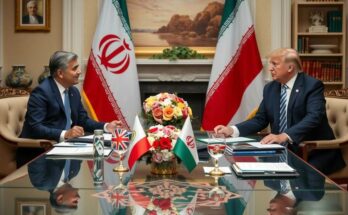Iran’s government spokesperson, Fatemeh Mohajerani, discussed the country’s diplomatic stance on snapback threats, its upcoming presidential visit to Egypt, and positive reflections on FATF approval amid economic development initiatives focusing on the Makran Coast.
In a recent cabinet meeting held in Tehran, Fatemeh Mohajerani, the spokesperson for the Iranian government, shared insights regarding Iran’s position on potential snapback sanctions and emphasized the nation’s commitment to diplomatic dialogue. She expressed hope for a more rational approach from the West to address ongoing concerns through negotiations, which Iran is actively pursuing via its Foreign Ministry.
Mohajerani highlighted the significance of the snapback mechanism as articulated in the 2015 Joint Comprehensive Plan of Action (JCPOA), noting its role in imposing UN sanctions based on claims of noncompliance that may be politically influenced. Moving on to Iran’s forthcoming presidential visit to Egypt, she articulated the importance of diplomatic endeavors for enhancing economic relations between the two nations, indicating sustained progress attributed to various administrations.
Additionally, Mohajerani announced new cabinet-approved initiatives aimed at strengthening development along Iran’s Makran Coast, a vital economic asset in line with the leadership’s directives for maritime development. She affirmed, “Our country’s coastline, particularly the Makran coast, is a significant asset and can serve as a major economic driver for us.”
Lastly, she addressed queries regarding the positive indications from Iran’s Expediency Discernment Council concerning their stance on the Financial Action Task Force (FATF) regulations, expressing trust that relevant stakeholders will collaboratively work to tackle national issues and assertive optimism for successful FATF approval.
The topic primarily revolves around Iran’s diplomatic and economic engagements as articulated by the government spokesperson. The snapback mechanism is a crucial element of the international agreements to control nuclear proliferation, which allows for the immediate reimposition of UN sanctions if accusations of Iran’s noncompliance emerge. Additionally, the discussions touch upon the importance of Iran’s economic strategies concerning its coastal areas, particularly the Makran Coast, and the implications of aligning with the FATF standards aimed at combating financial misconduct.
In summary, Fatemeh Mohajerani’s statements underline Iran’s ongoing commitment to diplomatic resolutions regarding the snapback mechanism and their international relations, particularly with Egypt. The government’s efforts in enhancing economic opportunities through maritime development and optimistic dialogue regarding FATF regulations signal a proactive approach in addressing internal challenges while fostering international cooperation.
Original Source: www.tehrantimes.com




